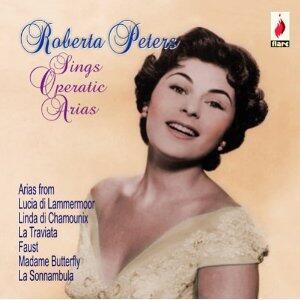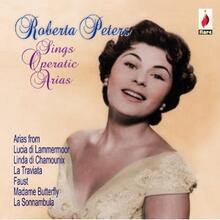Roberta Peters
At just nineteen, singer Roberta Peters made her debut at the Metropolitan Opera in 1950, singing Zerlin in Mozart’s Don Giovanni as an emergency replacement for a colleague. She subsequently achieved the longest tenure of any soprano in the history of the Metropolitan Opera, performed in 57 Texaco radio broadcasts heard live from the Met, and made an unprecedented 65 appearances on the Ed Sullivan show. She continued performing throughout her life and taught master classes around the world. Peters served as chairwoman of the National Cystic Fibrosis Foundation and was involved in many Jewish organizations and causes, including being a board member of the Anti-Defamation League. She was appointed to the National Council of the Arts in 1991 and was awarded the National Medal of the Arts in 1998.
Early Life and Performance Beginnings
When Roberta Peters was just thirteen, famed tenor Jan Peerce suggested she take lessons to cultivate her amazing natural voice. Six years later, she made her debut on the stage of the Metropolitan Opera—and has been dazzling international audiences ever since.
Roberta Peters was born on May 4, 1930, in New York City. Despite their modest means, her parents, Ruth (Hirsch), a milliner, and Sol Peterman, a shoe salesman, arranged the private tutoring in language, piano, drama, and ballet that made possible their only child’s remarkable career. In 1949, after hearing her audition in the studio of her teacher, William Herman, the late renowned impresario Sol Hurok took Peters under his wing, despite her youthful nineteen years and complete lack of performing experience. Hurok arranged her audition for Rudolf Bing, then general manager of the Metropolitan Opera, which led to a contract to appear as the Queen of the Night in Mozart’s The Magic Flute. As fate would have it, the young singer was called upon several weeks earlier, on November 17, 1950—with just six hours’ notice—to replace an indisposed colleague as Zerlina in Mozart’s Don Giovanni. Peters subsequently earned acclaim singing such coloratura “leading ladies” as Lucia in Lucia di Lammermoor, Gilda in Rigoletto, and Rosina in The Barber of Seville, as well as roles in other styles: Mozart’s Zerlina, Susanna, Despina, and Queen of the Night; Richard Strauss’s Zerbinetta; Johann Strauss’s Adele; Donizetti’s Adina and Norina; and Menotti’s Kitty, a role she created for the American premiere of The Last Savage at the Metropolitan Opera. She also added roles in romantic operas, including La Traviata and La Bohème, to her repertoire, with much success. In fact, Peters achieved the longest tenure of any soprano in the history of the Metropolitan Opera. A performer in fifty-seven Texaco radio broadcasts heard live from the Met, she also made an unprecedented sixty-five appearances on the Ed Sullivan television show.
Worldwide Success
Beyond her success on American stages, the renowned singer performed in operas, concerts, and recitals with some of the world’s greatest conductors and orchestras. Peters made her European debut as the Bohemian Girl under the direction of Sir Thomas Beecham at London’s Covent Garden. Her performance as Queen of the Night under the direction of Karl Böhm at the Salzburg Festival won high praise, as did her appearances at the Kirov Theater in Leningrad and the Bolshoi Theater in Moscow, where she became the first American-born artist to receive the coveted Bolshoi Medal.
With varied repertoire ranging from baroque masterworks of Bach and Handel through German lieder, French, Italian, Spanish, and English art songs, and American folk songs, Peters presented recitals and master classes throughout the world. In 1979, she traveled to the People’s Republic of China. Tours of Japan, Korea, Hong Kong, and Taiwan followed in 1987, 1988, and 1990.
Peters was also a popular recitalist and master teacher on the American college and university scene. Her successes there—and throughout the world—were acknowledged with the awarding of honorary doctorates from Lehigh, St. John’s, Rhode Island and Richmond universities, as well as from Elmira, Westminster, Colby, New Rochelle, and Ithaca (where she served as honorary trustee) colleges.
Philanthropic Work and Honors
While maintaining a schedule averaging forty concert appearances each year, Roberta Peters also lent her efforts to a variety of social causes. She served as chairwoman of the National Cystic Fibrosis Foundation for several years and has appeared in concerts benefiting AIDS research. She took an active role in efforts to promote government funding for the arts and served on the boards of the Metropolitan Opera Guild and the Carnegie Hall Corporation. She was also an artistic advisor on the boards of the Kravis Center for the Performing Arts and the Jupiter Theatre in Florida.
President John F. Kennedy first invited Peters to appear at the White House and she has appeared to sing for every president since. In 1991, she was appointed by President Bush to a five-year term on the National Council on the Arts. President Clinton awarded Peters the 1998 National Medal of Arts, and two years later, New York City Mayor Giuliani awarded her the Handel Medallion, a tribute to individuals who have enriched the city’s cultural life. Roberta Peters made Israel and music of Jewish interest an important priority in her life. Although she received no formal Jewish education, she learned to speak Yiddish as a child from her grandmother, who spent most of the year living with the Peterman family while her husband served as maitre d’ at Grossinger’s Hotel in the Catskill Mountains, and with whom the young Roberta attended an Orthodox synagogue. Yiddish folk songs were always an integral part of Peters’ many performances for synagogue audiences and other Jewish groups. She was a prominent spokesperson for many Jewish causes, including the Hebrew University, where she established the Roberta Peters Scholarship Fund, and Israel Bonds, and served on the board of the Anti-Defamation League. Peters appeared often in Israel, performing to benefit her endowed scholarship, and for soldiers in 1967, when she and her colleague Richard Tucker were caught in Israel during the Six-Day War. In addition to performing contemporary works by leading composers Aram Khatchaturian, Paul Creston, and Roy Harris, she appeared in the 1973 Carnegie Hall premiere of Darius Milhaud’s Ani Ma’amin (with libretto by Elie Wiesel) and in the 1982 premiere of Abraham Kaplan’s Kedushah Symphony. In 1992, she received Bnai Brith’s Dor L’Dor Award, the organization’s highest honor, and in 1997, the National Foundation of Jewish Culture awarded her its Jewish Cultural Achievement Award in Performing Arts for “her talent, her charm, and her commitment to the arts as well as to the Jewish people.”
Other Endeavors and Personal Life
Although opera played the defining role in her artistic life, Peters also performed in operetta, musical comedy and film. Early in her career she played a feature role in the movie Tonight We Sing (1953), and she returned to film to appear in City Hall in 1996. An avid tennis player, Peters also appeared in several celebrity tournaments.
Roberta Peters was the author of her own memoir, Debut at the Met (with Louis Biancolli, 1967) and earned critical acclaim for her many recordings for RCA, Deutsche Grammophon, CBS, and London Decca. Her famous interpretations of Gilda, the Queen of the Night, and Rosina were re-released on compact disc.
Peters was married to fellow opera star Robert Merrill in a 1952 ceremony at New York’s Park Avenue Synagogue, but the young couple divorced later that same year. On April 10, 1955, the star performer and teacher, and dedicated servant of a host of worthy causes, married to prominent real estate investor Bertram Fields. They were the parents of Paul, a businessman, and Bruce, a banker.
In the fall of 2000, Peters went on a national recital tour, culminating in New York City, where, on November 17, 2000, she gave a special performance at Lincoln Center to celebrate the fiftieth anniversary—to the day—of her Metropolitan Opera debut.
Peters died on January 18, 2017 in Rye, New York.
Selected Discography
Il Barbiere di Siviglia. RCA 6502; Rigoletto. RCA 60172; Die
Zauberflote. Deutsche Grammophon 435395.
Lyman, Darryl. Great Jews in Music (1986); Slonimsky, Nicolas. Baker’s
Biographical Dictionary of Musicians. 8th ed. (1993).






